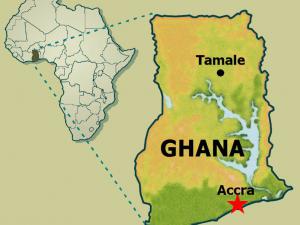GOOD PRACTICE Strengthening the civil registration system for informal economy operators (Ghana)
Discussion details

In Ghana, the National Health Insurance System (NHIS) was successfully involved in facilitating the registration and membership card renewal of an EC supported project’s beneficiaries. The project focused, among other aspects, on market access of women shea producers through cooperative action. Using a combination of sensitization, logistics support, and techniques for facilitating registration and organizing women producers it was possible to reach the goal of improved access to these public services.Meetings with the staff of regional offices of NHIS were used to convince them to participate in sensitizing clients on the importance of the NHIS and help them understand that the project valued their role as service providers. Logistics support, such as vehicle and a public address system, was also provided to facilitate their travel to the sites for mass registration.
NHIS staff gave presentations of the role of their institution and the benefits for the population in the project field sites. The NHIS staff were asked numerous questions since many women were unaware of the existence of such health insurance schemes. They also had to listen to complaints about non/late delivery of cards, difficulties in renewing cards as well as about the frustrations that card bearers encountered at various delivery points. This exposure helped make the NHIS staff more aware of the harsh conditions of remote and vulnerable populations.
Techniques for facilitating registration included getting women to make contributions in instalments towards registration and renewals. It also included scheduling bulk registrations in the communities thus extending registration operations beyond the projects’ beneficiaries through a cascading effect. Project officers also contributed by picking up the expired cards of women and bringing them to the NHIS offices.

Women producers have been organised in community social funds (CSF) that were connected to Micro Finance Institutions to obtain financial support for their production activities but also for NHIS registration. This allowed the CSF members to share their health risks as they can pool resources together through the CSF to access healthcare. An increased attendance to health facilities has been observed with earlier treatment of sicknesses/diseases.NHIS officials now travel to renew expired cards and register new clients as a result of the collaboration between the NHIS and the shea associations. The good practice described is an illustration of the role that civil society organisations can play in complementing government institutions to fulfil development agendas such as the achievement of universal heath care services. The logistical support provided may raise the question of the sustainability of the good practice. It is up to the NHIS administration to incentivize its staff through the achievement of quantitative goals for new registrations and renewals.
________________________________________________________________________________
Identification of Innovative Approaches to Livelihood Enhancement, Equity and Inclusion of People Dependent on the Informal Economy
Volume 1: Good Practices and Lessons Learned
Extracted from 33 Projects Selected Under the 2009 EC call for Proposals:
“Investing in People. Promoting social cohesion, employment and decent work. Support for social inclusion and social protection of workers in the informal economy and of vulnerable groups at community level”
March 2016
By Jacques Charmes, Mei Zegers
Log in with your EU Login account to post or comment on the platform.